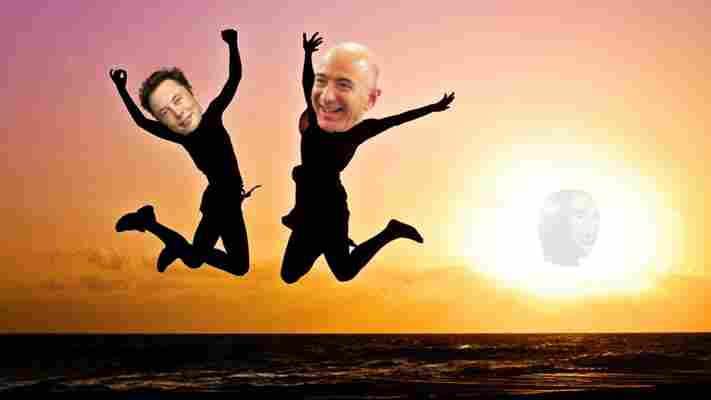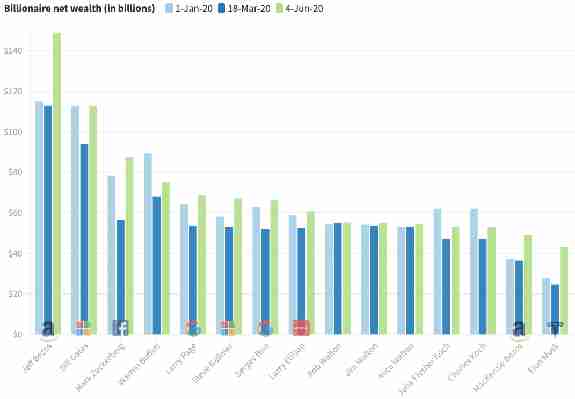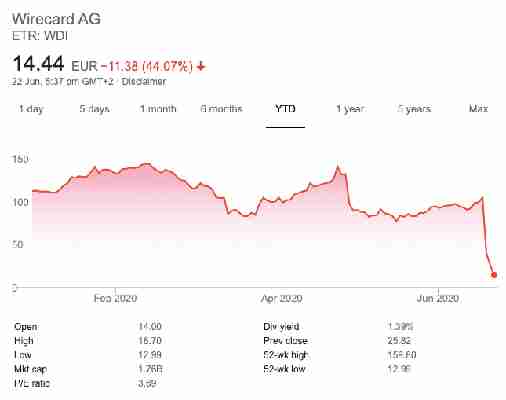The old saying goes that there exists but two certainties in life: death & taxes. Turns out there’s a third. Be it global pandemic or widespread civil unrest — US billionaires get richer.

Not only has the wealth of the American billionaire class swelled by 19% since COVID-19 shutdowns began (up $565 billion since March 18), but $79 billion was added to their fortunes in just the last week.
That, according to long-serving progressive think tank Institute for Policy Studies (IPS), pushed their total wealth beyond $3.5 trillion — a staggering figure that uncomfortably contrasts the 21.5 million Americans now collecting unemployment benefits.
“In a turbulent week in the life of the nation, these statistics remind us that we are more economically and racially divided than at any time in decades,” said IPS’ Chuck Collins, an expert on US inequality and the racial wealth divide.
Top tech billionaires have fully recovered since the stock market crash
As one might expect, Amazon’s Jeff Bezos is still the richest billionaire , but IPS data shared with Hard Fork shows that he’s earned more billions than anyone else this year.
Bezos casually started 2020 with a cool $115 billion. But COVID-19 mania would soon send stock markets crashing, which wiped around $2 billion from the Amazon co-founder’s personal fortune.
Amazon stock bounced hard in April to shatter price records, triggered by surging consumer interest during the pandemic. As a result, Bezos is up $34 billion since January 1 — a 29.6% wealth increase.


After Bezos, Tesla’s Elon Musk has added the most to his wealth: $15.3 billion this year, a gooch-tickling 55% rise.
Embattled Facebook chief Mark Zuckerberg also scored well. He’s worth 11% more, up $9 billion; the same amount earned by Microsoft‘s former chief excitement officer Steve Ballmer.
Dynasties like the Koch and Walton families made noticeably less than their tech counterparts, with the former poorer since the start of the year according to IPS’ analysis.
Bezos and co. could learn from the founder of Craigslist
When asked who should inspire our tech billionaires to do good with their newly generated riches, Collins told Hard Fork: “I think of people who created technologies and ‘platforms’ but left the wealth of the commons.”
“I think of people like Craig Newmark who didn’t monetize the commons he built. The creators of the world wide web and Wikipedia.”
Come to think of it, Wikipedia isn’t selling discount “police strength” pepper spray while arming law enforcement with fundamentally biased facial recognition tech .
Collins has a point.
Wirecard’s missing billions: Do they exist, or did Germany just get its own Enron?
Mystery surrounds billions of euros missing from embattled German fintech firm Wirecard, a scandal that’s not only rocked its share price, but caused its billionaire CEO Markus Braun to resign.

Stock in Wirecard, which serves as a middle-man for international ecommerce, has crashed almost 90% since the company admitted EY auditors had failed to trace 1.9 billion euros ($2.1 billion) last Thursday — cash that represents roughly two-third’s of the company‘s revenue from 2019.
Today, Wirecard conceded the prevailing likelihood is that the related bank trust account balances “ do not exist, ” and effectively blamed the snafu on a supposedly untrustworthy third party business.
“[Wirecard] continues to investigate whether, in what way and to what extent this business was actually carried out in favor of [Wirecard],” said the company in a statement.
Here’s how Wirecard allegedly cooked the books
It’s a sign that long-standing accusations that the company had been cooking its books could finally be proven true. Last year, the Financial Times reported evidence provided by a whistleblowing employee that showed three Wirecard execs working out of Singapore had created a fake paper trail consisting of forged invoices and agreements in a bid to inflate revenues across Asia.
Cash would allegedly flow from a German bank owned by Wirecard and show up on the balance sheet of an overseas subsidiary, leave to sit briefly in the books of a third-party “customer,” only to finally arrive back in Wirecard‘s account in yet another country as totally legit revenue.
The end goal for Wirecard‘s allegedly dodgy execs was to keep the company‘s vast network of Asian subsidiaries from missing profit targets by filling gaps with “fake and backdated sales agreements,” ultimately fooling local auditors. Singapore police raided Wirecard‘s offices back in February 2019 following FT’s report.


Last Thursday, Wirecard confirmed its external auditors had found “indications that spurious balance confirmations had been provided” to weave “a wrong perception of the existence of such cash balances or the holding of the accounts for to the benefit of Wirecard group companies.”
CEO Markus Braun resigned last week over the allegations, which stretch back more than decade . Braun, who invested millions of his own dollars to lead Wirecard out of the bleak post-dot-com era and into Germany‘s exclusive Dax 30 index, has continuously denied any wrongdoing. In a video message posted on his way out ( but now removed ), Braun floated the possibility that Wirecard had been the victim of fraud of “considerable proportions.”
Both Munich’s top prosecutor and Germany‘s equivalent of the SEC had already formally begun looking into the matter, with the latter searching Wirecard offices earlier this month as part of its criminal investigation into the company‘s top execs, including Braun.
The big question remains: Do the billions actually exist?
For now, the paper trail puts the missing cash in the Philippines, specifically in two banks: BDO Unibank (Philippines’ largest bank by assets) and the Bank of the Philippine Islands (BPI).
However, both banks have since denied any banking relationship with Wirecard. In fact, they’ve stated that no money had ever entered the Philippines. According to the nation’s central bank governor, a document used to prove the existence of funds had been forged.
A preliminary BPI investigation reportedly found an assistant manager had signed the document. That allegedly rogue employee had since been suspended. Over at BDO, the bank has moved to terminate a banking officer who had allegedly fabricated a related bank certificate. Both parties are still investigating.
German media has named one person that might know where the missing money could be: lawyer Mark Tolentino , a Wirecard trustee reported to be responsible for investing a little more than 1.9 billion euros in assets on behalf of Wirecard and its subsidiaries.
Tolentino is an interesting figure in his own right. He was hand-chosen by the Philippines‘ hardline leader Rodrigo Duterte for a senior position in the government’s Ministry for Transport around 18 months before he started working at Wirecard, and reportedly often appears on the radio for legal question and answer sessions.
While Tolentino commands a large following on both Facebook and YouTube, his social media channels are now silent and the website of his law firm is now offline.
Handelsblatt today reported its journalists had managed to get in touch with Tolentino, who (via another lawyer) denied any knowledge or involvement in the alleged book-cooking.
According to Handelsblatt, Tolentino’s lawyer did not want to answer specific questions about the missing billions allegedly held in the Philippines, but stated that all of the firm’s services (including the opening and administration of Filipino accounts on behalf of foreign clients) were performed in strict compliance with local laws and regulations.
4 compelling conspiracy theories about Amazon’s beef with Visa
On a crisp autumn morning in London town, I awoke to an email from someone whom I hate but just can’t quit: Amazon.

The company was writing to notify me of some important news: it will soon stop accepting Visa credit cards for UK payments.
Customers will still be able to use Visa’s debit cards, but the firm’s credit cards are getting dumped on January 19.


Amazon blamed the move on Visa’s high processing fees, but conspiracy theorists suspect something bigger is afoot.
Were Jeff Bezos and his Sun Valley buddies plotting a financial revolution? Did Amazon need to save some dough to colonize the cosmos ?
I put on my tinfoil hat, rewatched JFK, and called up my pals in QAnon to find out what was up.
1. Amazon plans to crush payment providers
Payment processing firms are deeply integrated into our financial system, but their position could become less secure.
“Many merchants are looking for alternative ways to process customers’ payments, especially in light of the high fees charged by some providers, like Visa and Mastercard,” said James Hickman, the chief commercial officer at Ecospend, a UK fintech. “The decision is significant, however, in that it sets a precedent for many others to follow suit.”
Developments in Open Banking could allow Amazon to bypass card firms and take payments directly from customers. That could save Bezos some cash to splash on ego trips to space .
2. This is all because of Brexit
Visa’s charges have risen since the UK left the European Union. The EU had capped cross-border interchange fees at 0.3% for credit cards, but those rules have disappeared since Brexit.
In March, the Financial Times repoted that Visa planned to increase its interchange fees to 1.5%.
Martin Lewis, a financial journalist and founder of MoneySavingExperom , said Visa’s price-hike triggered Amazon’s ban.
Amazon has denied that Brexit was the specific cause of the dispute. Indeed, the company has also introduced new charges for Visa credit cards in Australia and Singapore. However, the increased costs in the UK could have deepened the feud.
3. Bezos is in bed with Mastercard
Mastercard has also increased its UK-EU interchange fees, but nonetheless escaped the credit card ban.
While Amazon currently uses MasterCard for its own credit card in the UK, the company says this relationship has nothing to do with the Visa feud.
In the wake of the announcement, however, reports emerged that Amazon could shift its co-brand credit card from Visa to Mastercard. Online searches for Mastercard, meanwhile, increased by 1,300% .
Perhaps Mohammed bin Salman isn’t the only person with Jeff Bezos’ dick pics .
4. It’s just a negotiation tactic
Amazon’s move could be an attempt to negotiate newer fees.
The move has already taken a chunk out of Visa’s stock price . The payments firm may want to negotiate before Amazon’s enormous market share causes further damage. The e-commerce giant’s January 22 deadline gives them some time to make a deal.
The outcome could be lower fees or more users for Amazon’s own payment system. Visa and its customers may suffer, but Bezos’ world domination plans could go from strength to strength. Congratulations, Jeff.











